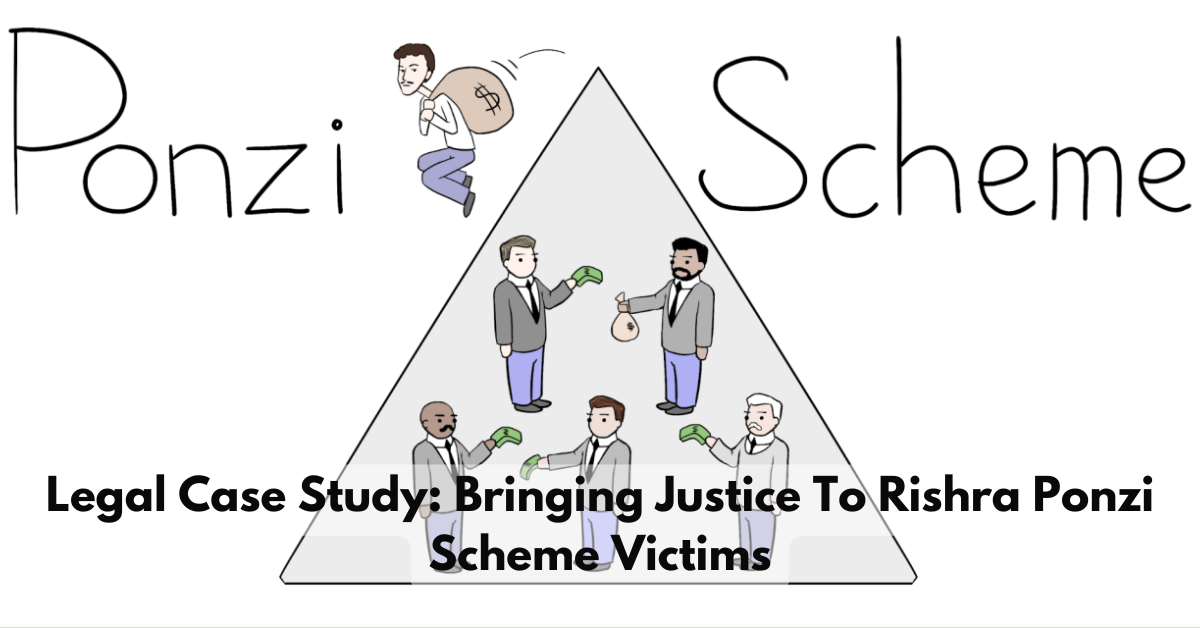
Legal Case Study: The Indore Ponzi Scheme Fraud
Case Overview
This case revolves around a self-proclaimed entrepreneur engaged in the wholesale and retail trading of packaged tea, who devised an elaborate Ponzi scheme to defraud several households in Indore. The perpetrator exploited his relationships with clients, particularly housewives, to collect substantial amounts of money, totalling approximately ₹10 crores, under the false pretence of offering high returns on investments in his “business.”
Parties Involved
- Defendant: The alleged businessman, who posed as a door-to-door tea trader.
- Plaintiff: A determined woman who, after losing her investment and being abandoned by legal professionals, sought assistance from a legal and investigative team.
- Other Victims: Multiple households, mostly comprising housewives, who invested money in the scheme but eventually gave up pursuing recovery efforts.
Modus Operandi
The defendant began by selling packaged tea door-to-door, using a fabricated backstory of hardship and familial dependency to gain the sympathy and trust of his customers. Over time, he fostered a relationship with his clients, specifically targeting housewives, and presented them with an opportunity to invest in his business, promising significant returns.
This scheme worked on a basic Ponzi framework, where initial returns were paid to early investors using funds from new investors, creating an illusion of profitability and success. The defendant never formalized the transactions, conducting all business dealings in cash to avoid leaving an evidentiary trail.
Key Events
- Initial Fraud: The defendant amassed ₹10 crores from around 10-15 households over several months. As suspicion grew, one victim approached the legal team at Innerwork Advisors LLP for assistance after others lost hope of recovering their investments.
- Discovery of Evidence: The legal team identified a critical piece of evidence—a cheque handed over by the plaintiff, which connected the plaintiff’s financial dealings with the defendant. This became a pivotal element in substantiating the fraudulent transactions.
- Escape of the Defendant: The defendant, anticipating legal action, fled the city, leaving his family behind. Despite attempts by other victims to seek justice, they were unsuccessful in legal proceedings until the plaintiff sought further help.
- Tracking and Arrest: With the cooperation of the local police and a private detective agency Innerwork Advisors LLP comprising retired officers from the Kolkata Police, the defendant’s IP address and mobile tower locations were traced. Legal efforts culminated in the issuance of an arrest warrant after the defendant failed to appear for questioning. The legal team provided swift representation to prevent any legal loophole from allowing the defendant’s escape.
- Legal Proceedings: The defendant was arrested and brought into police custody. Despite his attempts to evade justice, legal representation and thorough investigation led to the culmination of his prosecution.
Legal Issues
- Fraudulent Misrepresentation: The defendant’s scheme involved fraudulent misrepresentation of facts by making false promises to investors. The promise of high returns without any legal or financial structure was the core of the fraud.
- Ponzi Scheme: The business model of the defendant was a classic Ponzi scheme, where funds from new investors were used to pay returns to previous investors, rather than legitimate profits from business operations.
- Mens Rea: The defendant’s flight from the city indicated a clear intention (mens rea) to commit fraud and evade legal consequences, thereby reinforcing the criminal nature of the acts.
- Evidence: The challenge in this case was the lack of documented evidence, as all transactions were cash-based. However, the plaintiff’s cheque became key evidence that linked the financial dealings to the defendant’s fraudulent activities.
Legal Strategy
- Criminal Complaint: The team opted to pursue criminal charges rather than a civil lawsuit, as the defendant’s departure from the location clearly indicated intent to defraud (mens rea).
- Collaboration with Authorities: Close cooperation with law enforcement and the use of a private detective agency was essential to track the defendant and secure his arrest.
- Prevention of Evade: Legal representation was arranged promptly by Innerwork Advisors LLP team to prevent any attempt by the defendant to use legal loopholes to escape justice after his arrest.
- Evidentiary Focus: Leveraging the cheque as the foundational piece of evidence, the legal team focused on connecting it to the fraudulent transactions to strengthen the case.
Outcome
Through diligent efforts, the defendant was apprehended and held in police custody. The Innerwork Advisors LLP legal team’s integration of investigative tools and criminal law expertise ensured that the fraudster was held accountable. The case exemplifies the growing problem of financial crimes that prey on vulnerable individuals, as well as the effectiveness of a combined legal and investigative approach in combating such schemes.
Lessons Learned
- Importance of Evidence: Even in cash-based schemes, one piece of formal evidence, such as a cheque, can serve as a vital link in building a strong case.
- Preventive Measures: Quick legal action, including obtaining arrest warrants and preventing the exploitation of legal loopholes, is critical in cases where the defendant is likely to flee.
- Role of Private Investigators: Collaboration with seasoned detectives provided an edge in tracking down the defendant and gathering intelligence, proving the effectiveness of integrating legal and investigative strategies.
- Awareness and Vigilance: This case underscores the importance of financial awareness among common people, especially vulnerable individuals who may be susceptible to fraudsters’ manipulations.






